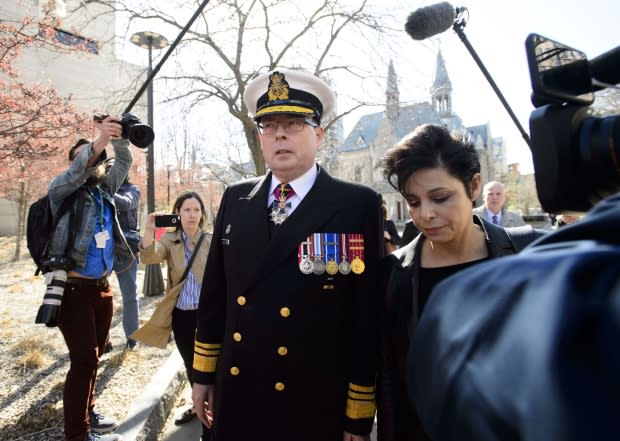Commons apologizes to Mark Norman as opposition MPs press for committee probe
The House of Commons voted unanimously today to apologize to Vice-Admiral Mark Norman for his legal ordeal, just days before opposition MPs are expected to push for a full-blown House of Commons committee investigation into the handling of the controversial criminal case.
Conservative MP Lisa Raitt proposed the motion, which saw the Commons recognize Norman "for his decades of loyal service to Canada, express regret for the personal and professional hardships he endured as a result of his failed prosecution and apologize to him and his family for what they experienced during their legal conflict with the government."
Prime Minister Justin Trudeau and several members of his cabinet were not in the Commons for the vote.
The Conservatives and the NDP wrote a letter last week to the Liberal chair of the defence committee asking for an emergency meeting Thursday, during which the opposition MPs will debate a motion to call a full committee probe.
One hour has been set aside to debate the motion — but a full-blown review cannot take place unless a majority of MPs on the committee support it.
It will be another crucial test for the Liberal government, which has faced allegations from both the Opposition and Norman's lawyer, Marie Henein, regarding political influence over decisions made during the prosecution of the military's former second-in-command.
Conservative defence critic James Bezan said it's important to get to the bottom of how the case unravelled and noted that the Liberals gave unanimous support to the apology.
"If they're ready to go that far, then they're ready for us to look at it, but the entire truth that hasn't been told yet [and] we do it through our investigation at committee," he said.
The Crown stayed a single charge of breach of trust against Norman last week, saying it did not have a reasonable prospect of conviction after the defence presented it with new evidence.
The lead prosecutor, Barbara Mercier, declined to say what that new information was — but indicated it was something neither she nor the RCMP had seen before.
The Mounties in charge of the investigation told The Canadian Press on Tuesday that they're not sure why the case fell apart and confirmed they have not seen the evidence upon which that decision was based.
Supt. Mike MacLean, criminal operations officer for the RCMP's national division, told the news agency they want to look at the fresh evidence in order to conduct "a proper analysis."
Public Safety Minister Ralph Goodale denied there was any political influence exerted in the case and defended the Mounties' handling of it.
"They would make their own decisions using their own professional judgments," he said, adding that he never had any communication with them about the Norman matter.
The former commander of the navy was accused of leaking cabinet secrets to the Davie Shipyard in Levis, Que., which leased the federal government a supply ship for the navy. Norman was accused of leaking the results of a Liberal cabinet meeting on the $668 million leasing project to a CBC journalist.

CBC News has reported that three former ministers in the Conservative cabinet of then-prime minister Stephen Harper, and a handful of staffers who were around when the shipbuilding project was negotiated, cooperated with the defence and provided information that may have been pertinent to the case.
Among other things, that information included confirmation that Norman had the authorization of the Harper cabinet to speak to the Davie Shipyard and share information as the project was assembled.
It's not clear whether the RCMP and the Crown knew of that authorization when they laid the charge against the veteran naval commander.
Justice Minister David Lametti has defended how the investigation unfolded and suggested it should be taken as a sign of confidence in the judicial process.
"I think the system worked in the sense that ... each component part did its job and the prosecution service in particular took evidence, evaluated it, decided to lay charges, decided to stay charges in an ongoing evolutionary process in which, as they had said, evidence came to light," he said. "So they, and their evaluation, they made a decision.
"I think ... that's indicative that the system works."

